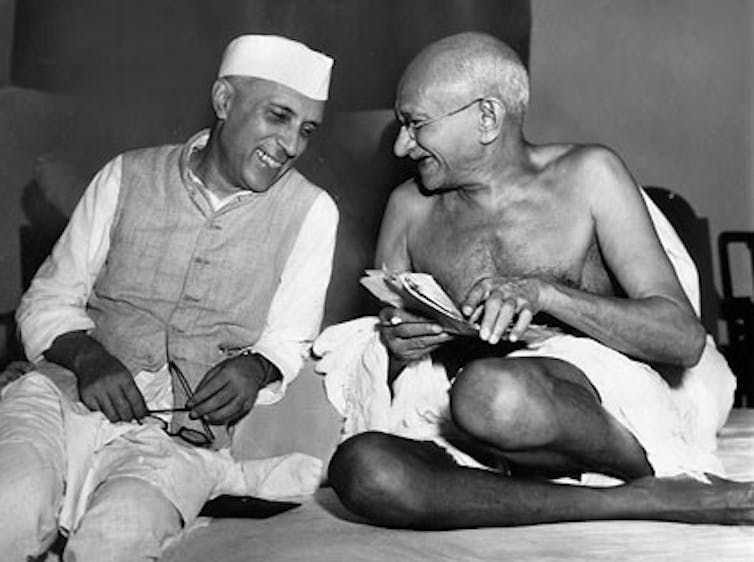– Prejudice and discrimination based on race; deeply embedded in colonial attitudes and policies.
– Indians were often treated as racially inferior under British rule.
Who is this?
Mohandas Gandhi
What were the names of the countries impacted by the partitioning?
India and Pakistan
Name four main religions in India prior to British settlement.
Hinduism, Islam, Buddhism, Jainism, Christianity, Sikhism, Judaism
In what year did India gain independence?
1947
Define militarism
– Refers to the belief in using military force to achieve objectives.
– Groups like the Indian National Army under Bose adopted militarism to fight colonial power.
What was Gandhi's first name?
Mohandas
What were the Princely States?
The princely states were semi-independent regions in India ruled by local monarchs (kings, nawabs, or maharajas) under the indirect control of the British Raj.
Which religion was the majority in British India before independence?
a) Islam
b) Hinduism
c) Sikhism
d) Christianity
Hinduism
Why did Gandhi call off the Non-Cooperation Movement after the Chauri Chaura incident?
a) Because British promised reforms
b) Because the movement turned violent, conflicting with his principle of nonviolence
c) Because it achieved independence
d) Because of pressure from other leaders
Because the movement turned violent, conflicting with his principle of nonviolence
Define nationalism
– The belief in and support for the right of Indians to self-govern and form a nation free from British rule.
– Indian nationalism united people across languages, regions, and religions.
Which nickname isn't one of Gandhi's official nicknames?
-Bapu
-Mahatma
-Father of the Nation
-Prince of Peace
-Gandhiji
The Saint of Sabarmati
Prince of Peace
Where did Mahatma Gandhi lead the famous Salt March in 1930?
a) Sabarmati
b) Dandi
c) Amritsar
d) Calcutta
Dandi
The partition of India in 1947 created a separate country primarily for followers of which religion?
a) Hinduism
b) Buddhism
c) Islam
d) Christianity
Islam
Why was the Jallianwala Bagh Massacre a turning point in the freedom struggle?
a) It led to immediate independence
b) It exposed British brutality and united Indians against colonial rule
c) It caused the British to grant India self-rule
d) It was the first battle between Indians and British soldiers
It exposed British brutality and united Indians against colonial rule
Define colonialism
– The practice of acquiring and exploiting colonies; India was a British colony for nearly 200 years.
– Indian leaders opposed the injustices of colonialism in speeches, writings, and protests.
What was the name of the British company that traded goods like spices, silk, cotton, tea, and opium between Britain, India, and the East.
East India Trading Company
The Quit India Movement was officially launched in which city?
a) Bombay (Mumbai)
b) Delhi
c) Chennai
d) Lucknow
Delhi
The idea that Hindus and Muslims were two separate nations is called:
a) Secularism
b) Two-Nation Theory
c) Non-Cooperation
d) Ahimsa
Two-Nation Theory
The Salt March or Dandi March was a protest against what?
Salt tax
Define imperialism
– The policy of extending rule over foreign countries; British control of India is a prime example.
– The independence movement fought directly against British imperialism.
Who is the man on the left?

Which city was the capital of British India before Delhi?
a) Calcutta (Kolkata)
b) Mumbai
c) Chennai
d) Hyderabad
Calcutta (Kolkata)
Which religious group formed the Indian National Congress to represent all Indians regardless of religion?
a) Hindus only
b) Muslims only
c) A secular coalition of multiple religions
d) Sikhs only
A secular coalition of multiple religions
Why was the Partition of India controversial?
Because it caused massive displacement and violence between Hindus and Muslims